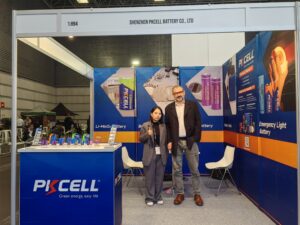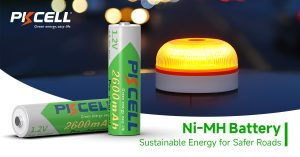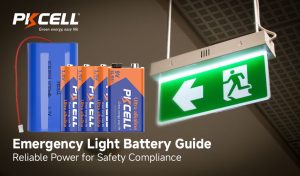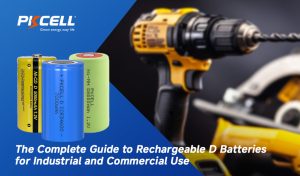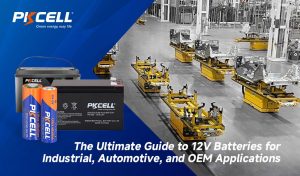
Key Highlights
- Alkaline batteries are made for one-time use. They are great for everyday devices like remote controls, toys, and digital cameras.
- They offer more power and last longer than carbon-zinc batteries.
- Alkaline batteries are available in sizes AA, AAA, C, D, 9V, 23A, and 27A.
- Following your local guidelines, throwing away alkaline batteries properly is important.
- Pick popular brands like PKCELL for a good deal and reliable performance while being mindful of the environment.
Understanding Alkaline Batteries
Alkaline batteries are a popular power source. They are easy to use and meant for one-time use, so you cannot recharge them. However, a few special alkaline batteries can be recharged a little. You can find these batteries in many household items and professional tools, which shows how important they are in our daily lives.
People like alkaline batteries for several reasons. They are very powerful, last a long time, and cost less. Compared to other primary batteries, like carbon-zinc, alkaline batteries provide more energy and last longer, making them a good choice for everyday use.
What are Alkaline Batteries?
Alkaline batteries are a kind of primary battery. They work by using a chemical reaction to produce electricity. This process cannot be reversed. Once the materials inside are gone, these batteries can’t make power anymore. You will have to change them when that occurs.
The battery’s voltage is very important. A regular alkaline battery gives off 1.5 volts, which stays strong for most purposes. You can connect several cells to create higher voltages, like in 9-volt batteries.
Alkaline Batteries Chemical Composition
Inside an alkaline battery, electrons move between two pieces called electrodes. The negative electrode is made of zinc, and the positive electrode uses manganese dioxide. A substance known as potassium hydroxide electrolyte helps the electrons move. This movement creates electric current that powers your devices.

Understanding how manganese dioxide works in alkaline batteries helps us learn how these batteries function and last longer. Alkaline batteries operate through a chemical reaction inside them. In these batteries, zinc powder serves as the negative electrode, and manganese dioxide acts as the positive electrode. They also contain an alkaline electrolyte, which is made of potassium hydroxide.

When you use a battery, a reduction reaction occurs at the zinc electrodes. This reaction creates voltage and turns zinc into zinc oxide at the anode. The overall reaction in the battery creates electricity. Knowing how these chemical processes work helps us better understand alkaline batteries and shows us how long they can last.
If you know about chemical reactions, here are some formulas. They explain why alkaline batteries can provide power:
(1): Zn(s)+2OH−(aq)⇌ZnO(s)+H2O(l)+2e–
(2): 2MnO2(s)+H2O(l)+2e−⇌Mn2O3(s)+2OH−(aq)
When you blend them, the complete reaction appears like this:
(3): Zn(s)+2MnO2(s)⇌ZnO(s)+Mn2O3(s)
The lifespan of Alkaline Batteries
The life of alkaline batteries varies based on several factors. A key factor is how fast the battery is used. High-power devices, like cameras or toys, drain alkaline batteries quickly. This is not the case with low-power devices, like remote controls, which use the batteries at a slower rate.
Temperature plays a big role in how long alkaline batteries last. Extreme hot or cold temperatures can change the chemical reactions inside the battery, impacting how well the battery works and how long it will hold a charge.
Storage conditions matter a lot. When you look at how long alkaline batteries last, several factors come into play. Temperature changes are important. How often you use them also matters. Plus, the place where you keep them is key too. All these things help to understand the lifespan of alkaline batteries.
Pkcell’s alkaline batteries can be stored at normal room temperature for up to 10 years.

Practical Applications of Alkaline Batteries

Alkaline batteries power many things in our homes. They are reliable and easy to find, making them great for everyday use. They give us convenience and enjoyment without interruptions.
Here are some common devices that use alkaline batteries:
- Remote Controls: AA or AAA alkaline batteries are usually found in TVs, audio systems, and other home entertainment devices.
- Toys: Many battery-operated toys use AA or AAA alkaline batteries. They give kids a lot of playtime.
- Digital Cameras: While some new cameras use lithium-ion batteries, many still rely on alkaline batteries, especially disposable ones.
- Clocks and Timers: A wall clock, alarm clock, or kitchen timer often works with AA or AAA batteries to keep the time right.
- Other Household Devices: Flashlights, portable radios, smoke detectors, and wireless keyboards are just some devices that commonly use alkaline batteries.
These applications show how important household batteries are in our daily lives.
Comparing the Common Batteries On The Market
Knowing the differences between battery types is important when picking the best power source for your device. Alkaline batteries are very common, but many other types exist for special purposes. When making your choice, consider cost, performance, and their effects on the environment.
This section discusses alkaline batteries and other common types of batteries you can find today. By learning about their advantages and disadvantages, you can make smarter choices that suit your needs.
Alkaline vs. Carbon Zinc Battery

Carbon-zinc batteries, also known as “heavy-duty” batteries, are a popular type of battery. They cost less than alkaline batteries. However, they do not work as well and do not last as long, so they are not the best choice for jobs that need strong power.
One big benefit of alkaline batteries is that they hold more energy. This means they can provide more power and last longer than carbon-zinc batteries. They also lose their charge at a slow rate. This allows you to store them for a long time without worrying about them running out of power quickly.
Carbon-zinc batteries often leak more as they age. Alkaline batteries usually leak less, making them safer choices for important electronics.
| Feature | Alkaline Battery | Carbon-Zinc Battery |
| Voltage | 1.5V | 1.5V |
| Energy Density | Higher | Lower |
| Shelf Life | Longer, 10 Years | Shorter, 3 Years |
| Leakage Risk | Less Prone | More Prone |
| Cost | Higher | Lower |
| Performance | Better for high-drain devices | Suitable for low-drain devices |
Alkaline and carbon-zinc batteries can usually be thrown in household trash. However, they might have heavy metals. It is a good idea to check your local rules. It is best to use recycling facilities for proper disposal to protect the environment.
Alkaline vs. Lithium-Ion Battery

Lithium-ion (Li-ion) batteries have transformed our use of portable electronics. They are lightweight, can store a lot of energy, and are rechargeable. You can find these batteries in many devices, such as smartphones, laptops, and electric vehicles. They perform much better than regular alkaline batteries, especially in devices that require high power.
Alkaline batteries are a low-cost option for gadgets that use small amounts of power. However, they don’t perform as well as Li-ion batteries in high-performance devices. Li-ion batteries store a lot of energy, making them ideal for items that need more power.
One of the biggest advantages of lithium-ion batteries is that you can recharge them. This sets them apart from single-use alkaline batteries. Being able to recharge many times reduces waste and saves you money in the long run, especially for cell phones. However, it’s good to know that lithium-ion battery systems are more complicated. They need special charging equipment. Additionally, lithium-ion batteries often cost more than alkaline batteries at first because of their advanced technology and better performance.
| Feature | Alkaline | Lithium-ion |
| Chemistry | Alkaline electrolyte, zinc anode, manganese dioxide cathode | Lithium ions moving between electrodes |
| Voltage | 1.5V | 3.6V |
| Energy Density | Moderate | High |
| Rechargeability | no-rechargeable | rechargeable |
| Cost | low | higher |
| Lifespan | 5-10 Years | 500+ Cycle |
| Self-discharge | Moderate | Low |
| Weight | Heavier | Lighter |
| Performance | better for low to moderate power device | Suitable for high power devices |
Alkaline vs. NiMH Battery

Nickel metal hydride (NiMH) batteries are well-liked because they work great and are low-cost. This is why many people choose them for different uses. You will see them in cordless power tools, digital cameras, and hybrid cars.
NiMH batteries can hold more energy than alkaline batteries, allowing your devices to run for a longer time. Unlike regular batteries, they also lose less charge when they are not in use. However, Li-ion batteries perform better in this area.
Nickel metal hydride batteries (NiMH) have some good points, but they also have problems. They often cost more than alkaline batteries and need special chargers to work properly. Another problem is the “memory effect.” This effect can cause the battery to hold less power if you use it a lot for short periods. To fix this, it helps to discharge nickel metal hydride batteries every now and then fully.
NiMH batteries are better for the environment. They do not contain harmful metals such as cadmium or mercury, which can be found in other types of batteries. They are also recyclable. This means they are a good option for powering various electronic devices. Using NiMH batteries can help lower the harmful effects on our planet.
| Feature | Alkaline | Single-Use |
| Voltage | 1.5V | 1.2V |
| Energy Density | Moderate | Higher |
| Cost | Low | Higher |
| Shelf Life | 5-10 Years | 3-5 Years |
| Cycle Life | Single Use | Hundreds of cycles |
| Performance | low to moderate power device | high power devices |
Tips on Selecting the Right Alkaline Battery
Choosing the right alkaline batteries is important for your devices. It helps them work properly and last longer. Consider the battery type, brand, and how you will use them. These things will help you make an intelligent choice.

- Check the correct battery size for your device.
- Alkaline batteries come in different sizes, such as AAA, AA, C, D, 9V, 23A, 27A, and button cell batteries. Each size matters. Using the wrong size can prevent your device from working properly or even damage it.
- Voltage: Most alkaline batteries supply 1.5V. Check that your device can use this voltage.
- Consider the Applicaitons:
- All alkaline batteries provide 1.5V, but they do not have the same power.
- If you need longer alkaline batteries, look at the Pkcell Ultra Alkaline Battery.
- Pkcell alkaline batteries have 30% more power than other brands.
- Look for Quality and Features:
- Brand Reputation: Popular brands, such as Pkcell, tend to have good quality control and reliable performance. Pkcell Battery is used in more than 100 countries, and many customers worldwide trust it.
- Leak-Proof Design: It is essential to choose batteries with a leak-proof design. This feature helps protect your devices from damage caused by leaking batteries.
- Consider the environment
- Choose batteries that do not contain cadmium, lead, mercury, or other heavy metals. These are the types of batteries that are good for the environment. You can dispose of them with regular trash. This also applies to cheap, low-quality alkaline batteries.
- Compare the Price
- Value for Money: Look at the price, features, and how well it should work. Sometimes, paying a bit more for better batteries makes sense. This is true for devices that use a lot of power or if you don’t use them very often.
1. Check the correct battery size for your device.
- Alkaline batteries come in different sizes, such as AAA, AA, C, D, 9V, 23A, 27A, and button cell batteries. Each size matters. Using the wrong size can prevent your device from working properly or even damage it.
- Voltage: Most alkaline batteries supply 1.5V. Check that your device can use this voltage.
2. Consider the Applicaitons:
- All alkaline batteries provide 1.5V, but they do not have the same power.
- If you need longer alkaline batteries, look at the Pkcell Ultra Alkaline Battery.
- Pkcell alkaline batteries have 30% more power than other brands.
3. Look for Quality and Features:
- Brand Reputation: Popular brands, such as Pkcell, tend to have good quality control and reliable performance. Pkcell Battery is used in more than 100 countries, and many customers worldwide trust it.
- Leak-Proof Design: It is essential to choose batteries with a leak-proof design. This feature helps protect your devices from damage caused by leaking batteries.
4. Consider the environment
- Choose batteries that do not contain cadmium, lead, mercury, or other heavy metals. These are the types of batteries that are good for the environment. You can dispose of them with regular trash. This also applies to cheap, low-quality alkaline batteries.
5. Compare the Price
- Value for Money: Look at the price, features, and how well it should work. Sometimes, paying a bit more for better batteries makes sense. This is true for devices that use a lot of power or if you don’t use them very often.
Why PKCELL Alkaline Batteries Are the Right Choice
Pkcell started in 1998 and is a leading battery manufacturer in China. Its focus is on safe and new energy solutions. Its large facility covers 28,000 square meters, and its team includes over 50 skilled researchers. Pkcell has delivered high-quality batteries to customers in more than 100 countries.
Pkcell is famous for its high quality and good performance. Many people all over the world trust them.
PKCELL cares about the environment. Our batteries do not contain mercury. This shows that we want to lessen our impact on nature.
Frequently Asked Questions
1. Can alkaline batteries be thrown away?
Many places let you throw away alkaline batteries in your household trash. However, you should check the rules for battery disposal in your area. This is very important in the state of California. The EPA suggests that you contact your local solid waste authority. They can help you find the right way to dispose of batteries. In some areas, alkaline batteries might be considered hazardous waste. They could need recycling or special steps for proper disposal.
2. Are alkaline batteries rechargeable?
Standard alkaline batteries are not safe to recharge, and it can be dangerous. A better choice is to use rechargeable batteries. Good options are nickel-metal hydride (NiMH) or lithium-ion (Li-ion) batteries. These work well for devices that need battery changes often.
3. What should I do about alkaline battery leaks
If you see leaks from alkaline batteries, remove them with care. Throw them away the right way. Clean any leftover liquid using a mix of water and vinegar. Make sure to wear gloves and keep the liquid away from your skin and eyes. If there is a lot of leaking, ask a professional for help.
4. What are the advantages of using alkaline batteries over other types?
Alkaline batteries have many nice features and impressive performance. They are cheap and provide a lot of power for their size. If stored properly and work well, they can last a long time. Their special design allows them to be used in different devices. Because they are easy to find and low in cost, they are a smart choice for many people.
5. How to dispose of corroded leaking batteries?
Corroded batteries that leak should be handled with care. The chemicals that come out can be harmful. It is important to wear gloves to protect your skin from these chemicals. If the leaking battery is an alkaline type, which is the most common, the leaked material is slightly acidic. You can use a weak acid, like vinegar or lemon juice, to neutralize it.
Put the damaged batteries in a sealed plastic bag or container. This will prevent more leakage and keep everything safe from contamination.

 USB Rechargeable Lithium Battery
USB Rechargeable Lithium Battery
